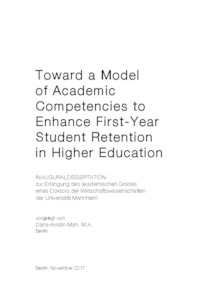|
Toward a model of academic competencies to enhance first-year student retention in higher education
Mah, Dana-Kristin
![[img]](https://madoc.bib.uni-mannheim.de/44211/1.hassmallThumbnailVersion/PhD%20thesis_Mah_Druckschrift_final.pdf)  Vorschau |
|
PDF
PhD thesis_Mah_Druckschrift_final.pdf
- Veröffentlichte Version
Download (4MB)
|
|
URL:
|
https://madoc.bib.uni-mannheim.de/44211
|
|
URN:
|
urn:nbn:de:bsz:180-madoc-442118
|
|
Dokumenttyp:
|
Dissertation
|
|
Erscheinungsjahr:
|
2017
|
|
Ort der Veröffentlichung:
|
Mannheim
|
|
Hochschule:
|
Universität Mannheim
|
|
Gutachter:
|
Ifenthaler, Dirk
|
|
Datum der mündl. Prüfung:
|
19 Dezember 2017
|
|
Sprache der Veröffentlichung:
|
Englisch
|
|
Einrichtung:
|
Fakultät für Betriebswirtschaftslehre > Wirtschaftspädagogik, Technologiebasiertes Instruktionsdesign (Ifenthaler 2015-)
|
|
Fachgebiet:
|
370 Erziehung, Schul- und Bildungswesen
|
|
Normierte Schlagwörter (SWD):
|
Studium , Deutschland , Studienabbruch , Studienabbrecher , Kompetenztheorie , Unterrichtstechnologie
|
|
Freie Schlagwörter (Englisch):
|
higher education , student retention , first-year experience , academic competencies , learning analytics , digital badges
|
|
Abstract:
|
Enhancing student retention in higher education has been a global issue for many years; however, withdrawals prior to degree completion remain at about 30% in member countries of the Organisation for Economic Cooperation and Development (OECD). As early withdrawals have consequences on different levels, such as for the individual, higher education institutions, and society, further research on student retention is still important and necessary. In Germany, empirical evidence describing student retention remains rare. Recently, however, some government initiatives on student retention in Germany have been funded, such as with regard to the demographic change and the demand for qualified academic employees for the German economy. The first year of higher education is considered particularly crucial, as students often decide to withdraw at this stage. Important factors for discontinuing higher education include the choice of the wrong course, lack of motivation, overload, an unsatisfactory first-year experience, lack of institutional support services, and personal factors, such as financial problems, health, and family circumstances. First-year students’ academic unpreparedness, perceptions, and expectations have also been found to contribute to discontinuing higher education studies. First-year students’ academic preparedness for higher education studies, which can be linked to the concept of generic skills, has not been thoroughly examined in the extant literature. Therefore, in the presented thesis, a conceptual model of decisive academic competencies for higher education was constructed, following a competency-based approach and with a focus on the first year in higher education. This model is designed to complement established models and theories addressing student retention in higher education, with a focus on five academic competencies: time management, learning skills, self-monitoring, technology proficiency, and research skills. This thesis aims to provide insight into students’ (student perspective) and academic staff (academic staff perspective) expectations and perceptions concerning academic competencies for higher education studies as well as the potential of learning analytics and digital badges (educational technology perspective). The thesis includes three quantitative studies (Study 1, Study 2, Study 3), one qualitative study (Study 4), and one theoretical research effort (Integrative review) to enhance first-year student retention in higher education and contribute to research in Germany. The proposed model of academic competencies may address the research gap relating to generic skills in higher education studies and serve as a platform for discussion about required academic competencies for higher education studies. Regarding the student perspective (Study 1, Study 2), one main finding indicated that first-year students assessed their skill levels in all five academic competencies as rather high. The findings also indicated first-year students’ perceptions of the role of academic staff in supporting student development, especially in research skills, and low self-reported confidence in this competency. Study 3 indicates that first-year students’ intention to leave the institution prior to degree completion may be influenced by their perceptions and expectations with regard to academic competencies, especially research skills. Regarding the academic staff perspective (Study 4), interviews with members of the academic staff indicated that their perceptions of first-year students’ academic competencies are lower than staff expectations. Academic staff often expect first-year students either to have already developed competencies for higher education studies based on their prior secondary education or to be responsible for developing these competencies on their own. Regarding the educational technology perspective (Integrative review), first learning analytics and then digital badges were presented, with an explanation of their objectives, purposes, functions, opportunities, and challenges concerning their potential to enhance student retention in higher education. Lastly, a conceptual model was proposed that synthesizes learning analytics, digital badges, and academic competencies. The findings of this thesis are discussed, practical implications are derived, and ideas for future research are presented. The findings in this thesis may contribute to the development of adequate support services that meet individual needs and move research on the first-year experience and academic competencies forward to enhance student retention in higher education.
|
 | Dieser Eintrag ist Teil der Universitätsbibliographie. |
 | Das Dokument wird vom Publikationsserver der Universitätsbibliothek Mannheim bereitgestellt. |
 Suche Autoren in Suche Autoren in
Sie haben einen Fehler gefunden? Teilen Sie uns Ihren Korrekturwunsch bitte hier mit: E-Mail
Actions (login required)
 |
Eintrag anzeigen |
|
